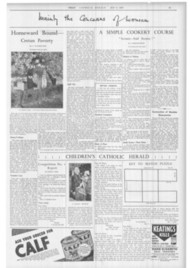Page 4, 9th July 1937
Page 4

Report an error
Noticed an error on this page?If you've noticed an error in this article please click here to report it.
Tags
Share
Related articles
Fiction Brett Young's Gift Book
A Box Of Fiction
But Homer
Criticism
Contemplative
Rugged Realities From Cowper Powys
Polemics Through Fiction From Tennyson Jesse
Maiden Castle. By John Cowper Powys. (Cassell, 8s. 6d.) Art of God. By F. Tennyson Jesse, (Heinemann, 75. 6d.) Is a Ship Burning. By Richard Sale. (Cassell, 7s. 6d.) King John of Jingaio. By Lawrence Houseman. (Cape, 7s. (,d.) Reviewed by FRANCIS BURDETT
There is an unmistakable quality about Mr. Powys' writing that may be as attractive to some as it is undoubtedly difficult and repellent to many. In Maiden Castle we are immersed at once in that turgid, haunted. strained and at times almost demoniacal world that he loves to create. The very names of his characters are abnormal; Dud No-man (for Dud, and he does not stand alone in the story in this matter, had no lawful father): Wizzie, an orphan; Thuella Wye; Enoch Quinn; Mr. Urgan.
Enoch Quirm, who did not wash or change his clothes, was repulsive in almost all normal respects but with his handsome features and dead eyes achieves a sort of grandeur in his belief that he was a reincarnation of a long-forgotten Welsh God.
No-tuan is a figure familiar to all readers of Mr. Powys's Autobiography. We recognise his farouche appearance, his uncouth walking stick, his manias, his intense selfabsorption and his occasional flashes of insight. We recognise, too, those frightful obsessions that are his daily torment, Meeting Wizzie at a travelling circus he buys her for eighteen pounds, lives with her but never marries her. Wizzie remains a rather shadowy figure amidst that strange group of figures to which Dud introduces her. Before she leaves she manages to blurt out some scathing truths about "her man" which are only too evidently true.
But it is Mr. Powys's intention in the creation of these characters to demonstrate his view of life; it is a view that is foreign to " normal " people and distressing even to those who find some pleasure in learning about it.
It is a very different world to which Miss Tennyson Jesse introduces us in Act of God. Mr. Powys's characters have a sort of rugged grandeur and vitality, whilst Miss Jesse's are subordinated to the thesis which she is arguing. They arc little more than the mouthpieces of polemics. The place is a small town on the Provencal coast. It has lately become known as a place of pilgrimage. Shops and charabancs cater for the pilgrims whilst the only effect on the town is to add greed to the other failings of its inhabitants.
There is a good, scholarly but foolish Curs who has made friends with an English Colonel who lives on his yacht in the harbour. The Colonel is admirable in every way save in, or perhaps especially in. his disbelief. He talks at great length to the Curd and he marshal's with ability all the arguments against revealed religion. He is greatly helped by the fact that it is of his cousin, an hysterical and unbalanced English woman, who impersonated Our Lady to the two children who saw the apparition that led to the founding of the pilgrimage.
1.ater she confesses this to some Groupers that happened to be staying in the hotel, The Cures faith is shaken because the authorities are made to condone the fraud so as to preserve the pilgrimage. It is all rather offensive and unreal from a Catholic point of view but Miss Jesse puts very well the position of many people today. The Church is disliked and despised and a superficial knowledge of its externals combined with a violent hatred of the supernatural is held to be sufficient ground for wholesale condemnation.
There is throughout the book a marked emphasis on the pleasures of the flesh: " Love had long been dead for him. though lust mercifully still had its pleasure for him on rare occasions." It is not from "rare occasions" in the book that we gather that Miss Jesse's dislikes are not for the functions of the body, but reserved for those of the soul.
Though I do not think that Is a Ship Burning is quite as striking as Mr. Sale's Not too Narrow . . . Not too Deep it is dramatic enough. The San Marino was on an eighteen days' cruise from New York and had just cleared Port of Spain when the story opens. Through the eyes of one of the officers we see the whole thing. We know enough of the passengers to get a grip of events when the fire breaks out. It arose from the unconscious carelessness of the doctor's strange patient, a grim and moving figure. There is a magnificent description of the burning ship and a stark and memorable account of the days that followed, first on a raft and then on a lifeboat.
No character is dim and some almost painfully alive and the writing is delightfully crisp. The only thing I regret is the amount of space that has been given to the unrepressed emotions of Sydney, a young Arnerican woman, who pursued the tonguetied officer.
King John of lingalo was first published in 1912. It is a delightfully written story of the straits to which Constitutional Monarchy has been, or may be, reduced by the encroachments of the Cabinet in democratic countries.
There is a quiet humour about it that is most attractive and the fact that what was written as a romance in distant pre-war days has in some ways been so strikingly verified by subsequent history adds to its interest.
blog comments powered by Disqus
















